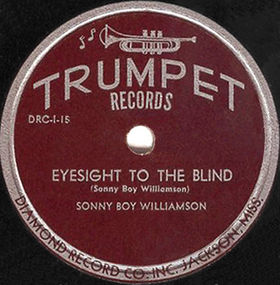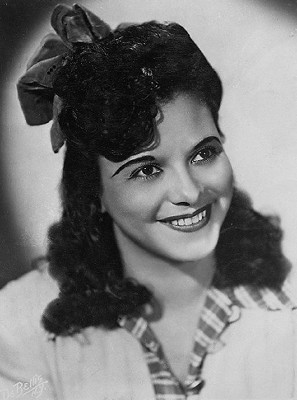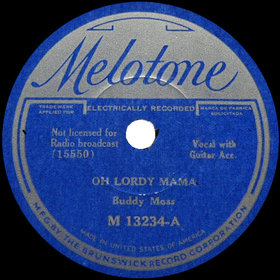Related Research Articles

Lucius Venable "Lucky" Millinder was an American swing and rhythm-and-blues bandleader. Although he could not read or write music, did not play an instrument and rarely sang, his showmanship and musical taste made his bands successful. His group was said to have been the greatest big band to play rhythm and blues, and gave work to a number of musicians who later became influential at the dawn of the rock and roll era. He was inducted into the Alabama Jazz Hall of Fame in 1986.

Sister Rosetta Tharpe was an American singer, songwriter and guitarist. She gained popularity in the 1930s and 1940s with her gospel recordings, characterized by a unique mixture of spiritual lyrics and electric guitar. She was the first great recording star of gospel music, and was among the first gospel musicians to appeal to rhythm and blues and rock and roll audiences, later being referred to as "the original soul sister" and "the Godmother of rock and roll". She influenced early rock-and-roll musicians including Little Richard, Johnny Cash, Carl Perkins, Chuck Berry, Elvis Presley, Jerry Lee Lewis, and Eric Clapton.
The Ravens were an American R&B vocal group, formed in 1946 by Jimmy Ricks and Warren Suttles. They were one of the most successful and most influential vocal quartets of the period, and had several hits on the R&B chart in the late 1940s and early 1950s.

The Golden Gate Quartet is an American vocal group. It was formed in 1934 and, with changes in membership, remains active.

The Jordanaires were an American vocal quartet that formed as a gospel group in 1948. Over the years, they recorded both sacred and secular music for recording companies such as Capitol Records, RCA Victor, Columbia Records, Decca Records, Vocalion Records, Stop Records, and many other smaller independent labels.
"Blues in the Night" is a popular blues song which has become a pop standard and is generally considered to be part of the Great American Songbook. The music was written by Harold Arlen, the lyrics by Johnny Mercer, for a 1941 film begun with the working title Hot Nocturne, but finally released as Blues in the Night. The song is sung in the film by William Gillespie.
"When the Saints Go Marching In", often referred to as simply "The Saints", is a traditional black spiritual. It originated as a Christian hymn, but is often played by jazz bands. One of the most famous jazz recordings of "The Saints" was made on May 13, 1938, by Louis Armstrong and his orchestra.
"Take My Hand, Precious Lord" is a gospel song. The lyrics were written by Thomas A. Dorsey, who also adapted the melody.
"I'll Fly Away" is a hymn written in 1929 by Albert E. Brumley and published in 1932 by the Hartford Music company in a collection titled Wonderful Message. Brumley's writing was influenced by the 1924 secular ballad, "The Prisoner's Song".

"Eyesight to the Blind" is a 12-bar blues song written and recorded in 1951 by Sonny Boy Williamson II. He also recorded the related songs "Born Blind", "Unseeing Eye", "Don't Lose Your Eye", and "Unseen Eye" during his career. The Larks, an American rhythm and blues group, recorded the song, which reached number five on the R&B charts in 1951. Several musicians subsequently recorded it in a variety of styles. The Who adapted Williamson's song for their rock opera Tommy.

Billy Ward and his Dominoes were an American R&B vocal group. One of the most successful R&B groups of the early 1950s, the Dominoes helped launch the singing careers of two notable members, Clyde McPhatter and Jackie Wilson.

Apollo Records was a record company and label founded in New York City by Hy Siegel and Ted Gottlieb in 1944. A year later it was sold to Ike and Bess Berman. Apollo was known for blues, doo-wop, gospel, jazz, and rock and roll.

Savannah Churchill was an American rhythm and blues singer in the 1940s and 1950s. She is best known for her number-one R&B single "I Want To Be Loved ."
The Larks were an American vocal group, active in the early 1950s. They were not the same group as the Los Angeles–based Larks featuring Don Julian, nor the Philadelphia-based group The Four Larks.

Allen Rathel Bunn, who was sometimes credited as Alden Bunn and who performed as Tarheel Slim, was an American singer, guitarist and songwriter whose work spanned gospel, blues, doowop, R&B, pop, and rockabilly. After singing in various gospel groups he became a member of The Larks before recording with his wife Anna Lee "Little Ann" Sandford, and then as a solo performer.
"Just a Closer Walk with Thee" is a traditional gospel song and jazz standard that has been performed and recorded by many artists. Performed as either an instrumental or vocal, "A Closer Walk" is perhaps the most frequently played number in the hymn and dirge section of traditional New Orleans jazz funerals. The title and lyrics of the song allude to the Biblical passage from 2 Corinthians 5:7 which states, "We walk by faith, not by sight" and James 4:8, "Come near to God and He will come near to you."
Thurman Ruth, who got his start in vaudeville in 1927, was a gospel singer, deejay and concert promoter, and a forefather of such rhythm and blues (R&B) producers as Ralph Bass. Ruth had organized the Selah Jubilee Singers, a gospel group drawn from the membership of a church choir, leaving it in 1949 to pursue more secular interests in music.

"Hey Lawdy Mama" is a Piedmont blues song recorded by Buddy Moss in 1934. The song became popular among jazz musicians with early recordings by Count Basie and Louis Armstrong. In 1943, a version recorded by Andy Kirk and His Twelve Clouds of Joy, with vocals by June Richmond, was a hit, reaching number four on the Billboard R&B chart.
The Cues were an American R&B vocal group, who recorded both under their group name and under various other names as backing singers for artists on Atlantic Records and other labels in the 1950s. They recorded as the Rhythmakers with Ruth Brown; as the Blues Kings with Big Joe Turner; the Gliders with LaVern Baker; and as the Ivory Tones with Ivory Joe Hunter. Independently, they also recorded as the Four Students. Researcher Marv Goldberg has claimed that "because of their unique role in the recording industry, The Cues probably participated in more hit records than any other group."
"My Lord's Gonna Move This Wicked Race" / "My Lord's Going to Move This Wicked Race" is a spiritual song that has been recorded by various groups. It was recorded for the Ozark Folksong Collection in 1951.
References
- ↑ Dixon, Robert M. W. Blues and Gospel Records: 1890-1943, Oxford University Press (1997), page 785 - ISBN 0-19-816239-1
- ↑ Dixon, Robert M. W. Blues and Gospel Records: 1890-1943, page 786
- ↑ "Marv Goldberg's R&B Notebooks" . Retrieved 2008-03-08.
- ↑ Rubin, Rachel. American Popular Music: New Approaches to the Twentieth Century, University of Massachusetts Press, page 170 - ISBN 1-55849-268-2
- ↑ Fox, Ted (1983). Showtime at the Apollo . Da Capo. pp. 227–231. ISBN 9780030605338.